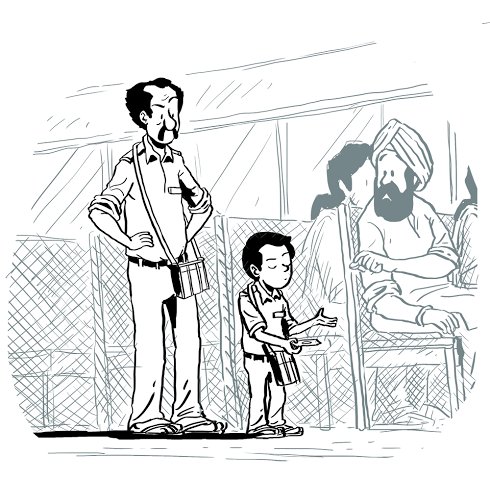Johor Banerjee lived in a country where the value of a man was determined by his father’s sperm. Johor repudiated this notion. He refused to have his life determined by gonads. It was undignified.
So here he was, early in the morning, on a bus, being confronted by a toddler. The child could not have been more than three. “Ticket, Uncle,” he lisped, holding out the scanner. His hair was curly. Johor placed his thumb on it, wincing slightly as his bank balance reduced. The scanner was designed by law to prick thumbs in the act of debiting, to remind them all of the value of money. The motion had been passed in the Lok Sabha to universal acclaim. All of them valued money, except for one or two members of the CPI.
The child did a little jig. “Papa, see see, I got one!” he piped happily. His father was working the other end of the bus. He gave him an indulgent smile. They wore identical uniforms. Father-and-son bus conductors were now one of the featured attractions of Delhi. Tourists often took pictures. They were perennial favourites, along with the mini-waiters at Pizza Hut, where they now matched pizzas and waiters by size.

His own father worked at the State Bank of India, like his father before him. Johor had never been to the bank and his father had never insisted. His mother’s resistance would have played a role. “What kind of place is that for a little boy?”, she would say. “Who knows who’s touched all that money? They will have pee and potty all over them.”
Johor’s mother mistrusted money, and people who had lots of it. It was a Bengali thing. Although not sure exactly what, she knew that the moneyed committed unspeakable acts, such as mixing with loose women, and drinking during the daytime. She was also very particular about hygiene. Her own father, a doctor from Chittagong, had used the phrase “pee and potty” frequently. He used revulsion to instill fear of bacteria. All his children did the same, often at family functions.
Not that life was bad at the State Bank of India. His father had never complained. His father had never discussed it. He was a man of few words. Johor had no idea what his father did. As a child, he had wondered. It was something to do with money, he knew. But from an early age, he had realised money was a matter of cards and thumbs and passwords. Johor knew no one else who had ever gone to an actual branch, except for his father.
To find out what life is really like at State Bank of India, read the next episode of “No Son of Mine” on Thursday.
Shovon Chowdhury is a novelist based in Delhi. His latest novel, Murder With Bengali Characteristics, is set in a Bengal occupied by China.



